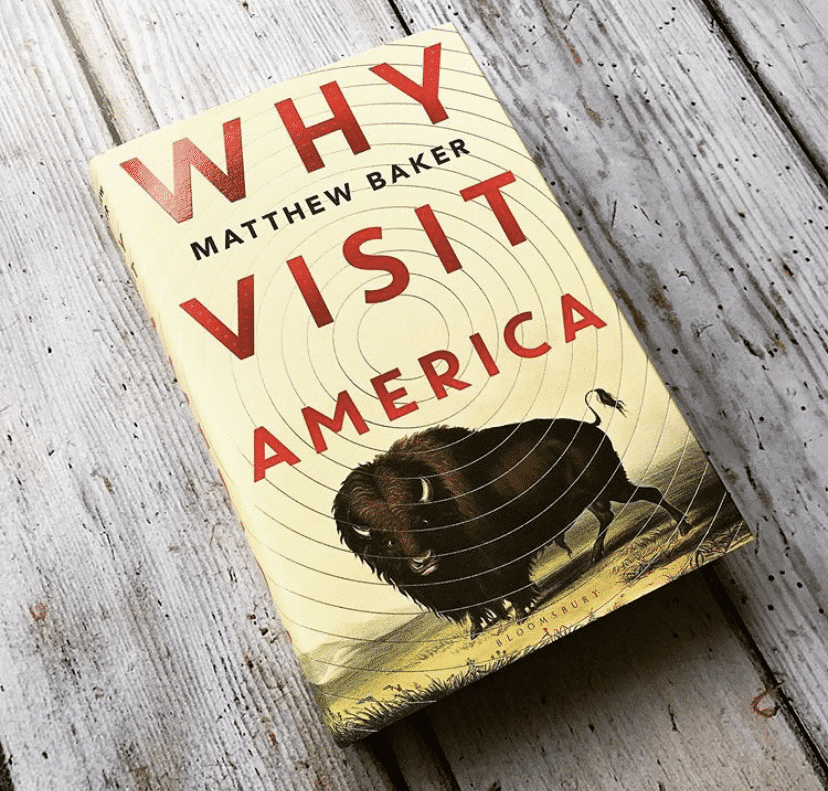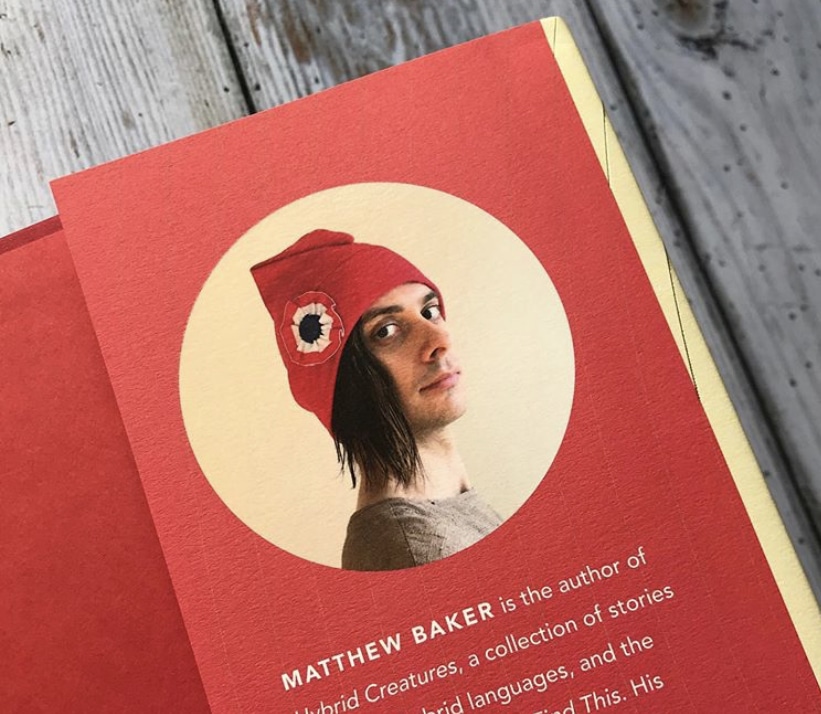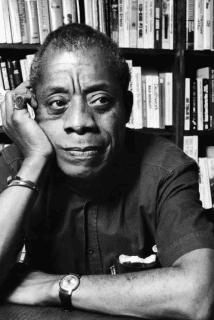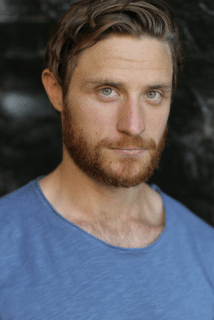The Perfect Book For A Nightmarish 2020
Culture
...is 'Why Visit America' by Matthew Baker. A collection of short stories which will satisfy all of your dystopian needs right now...
The buzz around Matthew Baker’s ‘Why Visit America’ is such that as it is released in the UK this week, about half of its 13 short stories have been optioned for film and TV adaptations by the likes of Netflix, Amazon and Fox Searchlight. The book, an exploration of contemporary issues through winningly smart speculative fiction, would be destined for cult status were it not for how eagerly it has been snapped up by the big boys in culture, and you feel the reason for its instant overground success is due to the fact its dystopian visions feel eerily attuned to life today. ‘Why Visit America’s stories are sci-fi at heart, and are by turns horrifying, hilarious and present disturbing futures which are all too plausible: ‘A Bad Day In Utopia’ about an advanced society which has bred out those disruptive creatures, men; ‘Life Sentence’ about a man who returns home to his family after having had his memory wiped as punishment for a terrible crime; ‘Transition’ about a young man who wants to transition from a physical existence into a purely digital one. As a read it is fun, thought-provoking and addictive as hell: you want to see where on earth Matthew Baker’s imagination is going to turn next.
We grabbed a word with Matthew on a Zoom call; he’s in lockdown in New York and viewing the various crises gripping his nation as a handy, if entirely unwanted, backdrop to his book…
Can you tell us about the book for those coming in cold?
It started as a concept: I wanted to write a book that contained 13 parallel universe stories, one for each of the original colonies in the United States. The idea was that over the course of the book the stories would span all 50 states of the country and that even though the stories would be speculative sci-fi in some way, the stories were meant to create a composite portrait of the real United States. I like to think of the book as a ‘through the looking glass’ reflection of who the United States is as a country. It’s a very strange book.
How did you write the stories? Were they pulled together in chaotic fashion or written in a more concentrated period?
It was more chaotic. I wrote the stories over a period of about ten years. I wrote a few of the stories before I had a clear vision for what the book would be. I was just writing these weird sci-fi stories that were set in parallel universe USAs that were pretty similar to our own except with one weird shift. I didn’t have the vision in mind for them yet, but as I was working on them I started developing the vision and then I started to build each new story into the book as a whole.
Was it a nightmare trying to fit all the States in once you’d started?
Yeah I had this whole list that I wanted to include. The biggest ones were the fifty states but I also wanted to include as many major American cities, landmarks and monuments as possible. But then I also had these less important side missions, like I wanted to include as wide a range of native flora and fauna as possible. I’d have these long lists of classic American animals and classic American plants. When I was working on a story I was worried about the narrative elements but I was also wondering, ‘Is there a place to fit an elk in this story?’ Or some species of tree. I made it much more complicated than it needed to be.
With writing short stories in different genres – there are moments of horror, detective fiction, as well as sci-fi – was the idea to do things that were challenging or fun for you?
Yeah I’d published a collection of stories before this one, there were only four stories in the book and they were very strictly experimental realism. And so it was very fun to shift to this book and experiment with those different genres. Something I’ve always loved about genre fiction, especially sci-fi, is – I don’t now if you feel like this in the UK, but in the US right now there’s a sense of society has become extremely polarised, politically and socially. In an environment like that it can be impossible to have a genuine conversation about issues that matter. Even if you’re talking with someone you agree with, these walls come up, these psychological barriers, which prevents any real exchange of ideas. The thing I’ve always loved about sci-fi is you can tell a story about an issue like that by disguising it in some way or putting it into a new strange form. For me that’s less about trying to push some propaganda on people and more about for myself as a writer – but also for readers – to find some space where we can grapple with the emotions behind these issues.
The stories take issues to their logical conclusion, like in ‘A Bad Day In Utopia’, in which men have been rendered obsolete in favour of a women-only world, except a few men kept in menageries outside cities to be used as sexual playthings. Feels like a stretch, but not that much, really…!
That story was inspired by the Chinese Academy of Sciences who in 2015 announced they had achieved a historic scientific milestone where for the first time they had created artificial sperms. They had taken stem cells from mice and then turned the stem cells into sperm cells and then fertilised egg cells to create new mice. And then I saw only 3 years later in 2018, the University of Cambridge said they were half way to achieving the same feat with human stem cells. I don’t know if that technology will ever exist, there are obviously technological and legal hurdles the scientists would have to get clear, but I am really interested in the idea of if men became reproductively obsolete, where would we go from there?
We’ve already seen some of the things in the stories start appearing in real life. Like in your story ‘Rites’, where it has becoming a social requirement for older people to kill themselves to preserve resources for everyone else – in the UK there’s been talk of extra taxes for over-40s because they are such a burden on society. That future doesn’t seem that far out.
Yeah and I think it’s the same with the story ‘One Big Happy Family’ where all children in the United States are brought up by the government. When I started writing it I was worried if it was too absurd, but now during the pandemic, because the American government has mishandled the situation and its got so much out of control, parents here are worried about what are we going to do when the school year starts again. We can’t send them back to school but also they have to work, to make money, to pay bills, but how do we work if the kids are sitting around at home. So you can see how maybe a world like that may make sense.
A bunch of the stories have been picked up by various studios, including Netflix – that’s great, but how do you handle it, and your relationships to the stories?
I know there are writers who feel like their stories when they’re adapted for film and TV still need to be that story that they wrote but for these particular stories I haven’t really felt that pressure. For me I’ve just wanted to see the best version of the story on screen. I’m sure there’ll have to be changes to help whichever story fulfil its potential on a new story telling medium. For me it’s been very exciting. Film has always had an enormous effect on me as a person and as a writer so stumbling into that world has been really great. We’ll see how they turn out.

How much control do you have? Could you demand to direct an episode of the TV adaptations, for instance?
Well I came to it accidentally. When I wrote the stories I thought best case scenario would be to find one university mag that will publish one and maybe they’ll send a check for $50 or maybe they’ll send me a couple of contributor copies, which I’d be happy with. That was the best I could have hoped for. So to get it optioned for films was way beyond that. When the first few were optioned I was just a writer who no one had ever heard of but as people in the film and television industry got to know me, they did warm up to me writing some of them myself. I’m adapting one of the stories, ‘Transition’, for Amazon Studios and then the title story for the book, ‘Why Visit America’, I’m also writing that as a series for FX. For the other stories I do have some degree of control but I also try to stay out of the way. I’ll be involved as people want me to be.
That title story, about a town which secedes from the United States to form its own country – but then call themselves America – seems to be about a country that’s lost its way or needs to reassess where it has got to – was that the central nub for you?
I think I have very conflicted feelings about the United States. Because I’ve always loved the vision of it. The idea of creating a democratic republic that welcomes immigrants from every nation and every culture and every religion, and granting freedom and justice and equality to all. But it’s also a vision that this country has never lived up to. A vision betrayed by the very founders of the country, who failed that from the beginning, failed to grant people of colour a right to vote, women a right to vote, the working class a right to vote, who granted the right to vote only to landowners – and yet were founding this country on stolen land.
I think that conflict from me was at the heart of the story, both the love I feel for the vision and the hope I feel that this country will finally achieve that vision. While at the same time looking back at 244 years of failure.
A big reassessment of the past is happening over here too, of our colonial history, although it’s very difficult to do that without people getting very defensive.
A large part of it is it can be difficult for people to sit down and have a conversation about even basic facts. In the US it long ago reached the level where a large section of the population doesn’t trust scientists anymore. And believe that climate change is a hoax and the coronavirus is a hoax. So do you want to have a conversation with people who don’t acknowledge facts? Maybe the only way is through fiction to create a story that is understood from the beginning is totally made up. And then go from there.
Where are you from in the States and how did it affect you as a writer?
I grew up quite near to Lake Michigan, so I got to grow up in a very beautiful landscape. There’s not another landscape quite like that in the US with giant sand dunes and lakes so vast you can’t see across them to the other side. But I also had maybe an unusual situation because I grew up with two families. My mum and my stepdad and my day and my stepmum. Between those two families I have a total of 11 grandparents, and countless aunts and uncles and cousins spread across the entire United States. We had family in Michigan, Virginia, Texas, Nevada, Montana, Florida, Illinois, Ohio, Kentucky, California and New York. In the summer we would take trips to visit different clusters of our family across the country. And I think that had a profound effect on me, to go and stay for a couple of weeks in a small town in Texas where we had family and getting a feel for what it’s like to live in Texas. Those experiences in the summer as a kid probably had a big effect on this book.
Can you give us an insight into your working practices – do you need a clean desk and an hour of meditation before you begin?
I guess there are a few constant factors. One is tea. The first thing I’ll do in the morning is heat a kettle of water for a pot of tea. Then the second factor is music. I’m always listening to music. I’ll usually listen to songs on a loop. I‘ll listen to one song for 6 or 7 hours which helps me mentally slip into this state where I can focus on one thing for a very long time.
I don’t write at a desk. I started out writing at a desk in the first couple of years but I’m a very slow writer so I usually write 8, 9, 10 hours a day so after a while I thought this is too long to sit at a desk so I transitioned to working on the couch and finally I got so lazy I thought I’m just going to work in bed. So I write in bed now.
That’s the dream, surely.
I highly recommend it. Especially now people have to work from home. Everyone can try it.
How is it in New York right now?
The numbers are very good, they seem to have got the pandemic relatively under control in this region, but I worry about whats going to happen if they send all the children back to school and all the college students back. And theres so many states where it’s spiralling out of control.
The American response has been about denying and blame gaming and an outright refusal to wear masks. I really think the situation would be relatively ok here if everyone put on a mask when they leave home but theres a certain section of the population that doesn’t want to be told what to do. If the message was that no one should wear masks, they’d be walking around with masks on.
It’s been a strange year.
It has. But a good backdrop for your book.
It does feel terribly appropriate. The entire country decided to throw me a dystopia party. ‘we heard you wrote this book of dystopian stories so we thought we’d turn the entire country into a true dystopia to celebrate the occasion.’ I would rather that they hadn’t done that, but that’s where we are.
Trending

Join The Book of Man
Sign up to our daily newsletters to join the frontline of the revolution in masculinity.

















